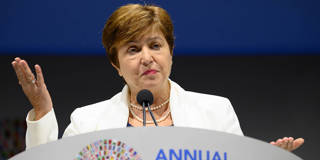Central bankers have been the first to recognize that the effectiveness of monetary policy in managing demand and stabilizing economic cycles has reached its limits. The problem is that many politicians and academic economists remain in denial.
LONDON – A mood of foreboding dominated this month’s annual meetings of the International Monetary Fund and World Bank in Washington, DC. But fear of a global recession was not the real cause. Although the latest update of the IMF’s World Economic Outlook showed economic activity slowing this year to its weakest level since 2009, the projected global growth rate of 3% is still far above levels associated with past recessions and would be consistent with decent economic conditions in most parts of the world – not a bad outcome for the 11th year of a sustained global expansion. And for next year, the IMF predicts that growth will accelerate to 3.4%, very close to the 3.6% estimate of the world economy’s long-run sustainable trend.

LONDON – A mood of foreboding dominated this month’s annual meetings of the International Monetary Fund and World Bank in Washington, DC. But fear of a global recession was not the real cause. Although the latest update of the IMF’s World Economic Outlook showed economic activity slowing this year to its weakest level since 2009, the projected global growth rate of 3% is still far above levels associated with past recessions and would be consistent with decent economic conditions in most parts of the world – not a bad outcome for the 11th year of a sustained global expansion. And for next year, the IMF predicts that growth will accelerate to 3.4%, very close to the 3.6% estimate of the world economy’s long-run sustainable trend.